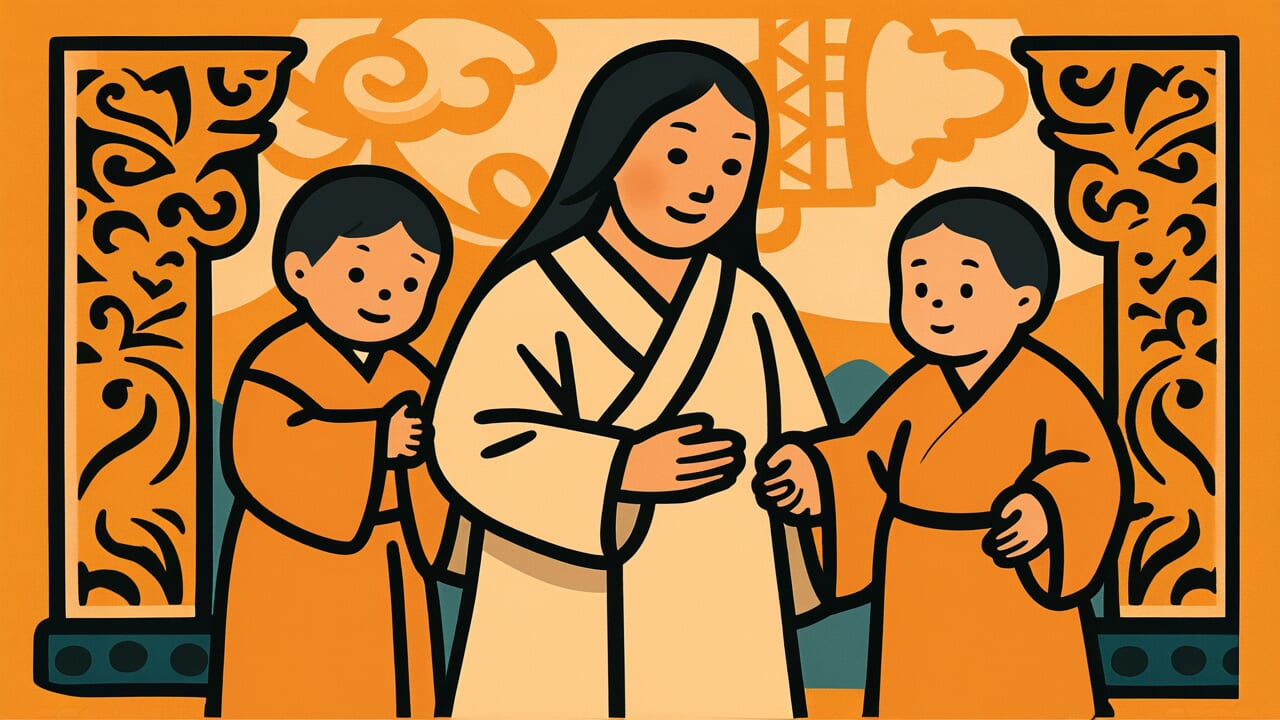How to Read “Parents wear cotton, children wear brocade”
Oya wa momen kiru ko wa nishiki kiru
Meaning of “Parents wear cotton, children wear brocade”
This proverb expresses the parental heart that lives simply to give children good things. Parents endure cheap cotton clothing for themselves and save that money to dress their children in expensive silk brocade. It symbolically shows the selfless love of parents.
This saying is used when you see parents sacrifice themselves to give their children a better environment or better things. For example, it describes parents who keep wearing old clothes while buying new ones for their children.
It also applies to parents who give up their hobbies and pleasures to pay for their children’s education.
People use this expression to convey the depth and nobility of parental love in a simple way. Even today, parents who put themselves last and prioritize their children are common.
This proverb views such devoted parental attitudes positively. It celebrates the beauty of this sacrifice.
Origin and Etymology
No clear record exists of when this proverb first appeared in literature. However, we can understand its background from how the words are structured.
The contrast between “cotton” and “brocade” forms the heart of this proverb. During the Edo period, cotton was widely used as everyday clothing for common people.
Brocade was a luxury item made by weaving beautiful patterns with gold or silver threads into silk fabric. Only wealthy merchants and the samurai class could afford to wear brocade.
This contrast reveals practical wisdom from daily life. Parents chose simple cotton for their own clothes and spent that saved money on their children’s clothing instead.
For common people of that time, clothing was a major expense. Growing children especially needed new kimono constantly. In this situation, parents put themselves last and wanted to dress their children in the best they could afford.
Japanese views on family and child-rearing deeply influenced the birth of this expression. The parental attitude of prioritizing children’s happiness above all else resonated across generations.
This shared feeling likely helped establish it as a lasting proverb.
Usage Examples
- My grandmother wears the same clothes for years, but buys new clothes for her grandchildren every year. This is truly “Parents wear cotton, children wear brocade”
- Watching my parents makes me understand “Parents wear cotton, children wear brocade.” They economized for themselves while paying for my education
Universal Wisdom
“Parents wear cotton, children wear brocade” reveals a universal truth about human love. It shows that love has priorities. Why do parents sacrifice themselves to give children good things?
Humans instinctively prioritize investing in the next generation. No matter how hard their own lives are, parents want their children to have better lives. This feeling isn’t based on logic or calculation.
Simply put, a child’s smile and happiness bring parents greater joy than their own satisfaction or pleasure.
This proverb has been passed down for generations because it touches a principle vital to society’s survival. If parents only pursued their own pleasure and ignored their children, that society would collapse within one generation.
Conversely, when parents sacrifice for their children, that society continues to prosper.
Our ancestors understood that this self-sacrificing love isn’t a loss. Instead, it brings life’s deepest fulfillment. Money spent on children enriches the heart more than money spent on oneself.
This paradoxical truth forms the core of this proverb.
When AI Hears This
The laws of thermodynamics state that disorder always increases in a closed system. For example, hot coffee cools if left alone, and neatly arranged bookshelves become messy over time. This is the law of entropy increase.
Yet parent-child relationships seem to challenge this law directly.
Something remarkable happens when parents pour their energy into children. The parent in a “high-energy state” depletes themselves to create a child in a “more ordered state.” This appears to violate physical laws.
But families aren’t closed systems—they’re open systems. Parents take in energy from outside through food and money, then selectively concentrate it on their children.
Biologist Schrödinger described life as an existence that “feeds on negative entropy.” Living things maintain their own order by slightly disturbing the order around them.
Parent-child relationships evolve this concept further. Parents sacrifice their own order to create a low-entropy state in the next generation, their children.
This “intergenerational transfer of information and energy” explains why life has continued for billions of years. Even as disorder increases in the entire universe, this small family system creates miraculous order through selective energy transfer called love.
Lessons for Today
This proverb teaches modern people what true wealth really means. We tend to think money and time spent on ourselves brings happiness. But resources used for others often create deeper satisfaction.
Modern society emphasizes self-realization and being yourself. That’s wonderful, but it risks the misunderstanding that “living for yourself” is the only path to happiness.
This proverb teaches that devotion to others, especially investing in the next generation, gives life deep meaning.
This isn’t limited to parent-child relationships. When you mentor someone younger, contribute to your community, or sacrifice today for tomorrow, the same spirit flows through those actions.
When you endure a little so someone else can shine, that choice has beauty.
What matters is that this self-sacrifice comes from natural affection, not force. Not from obligation, but when another’s joy becomes your joy—that’s when you become truly wealthy.



Comments